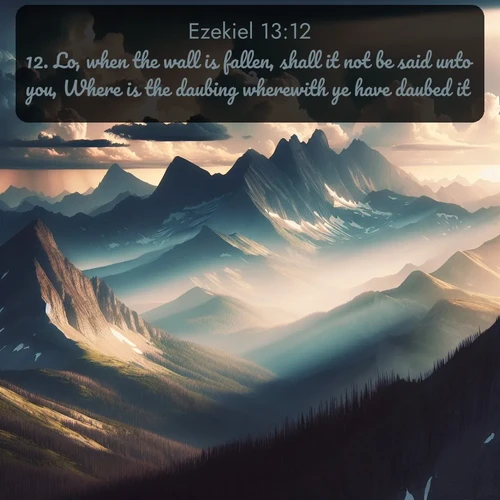Ezekiel 13:12 plusieurs versions / traductions
English Bible Translations
12. Lo, when the wall is fallen, shall it not be said unto you, Where is the daubing wherewith ye have daubed it?
12. Lo, when the wall is fallen, shall it not be said unto you, Where is the daubing wherewith ye have daubed it?
12. And when the wall has come down, will they not say to you, Where is the whitewash which you put on it?
12. And lo, when the wall is fallen, shall it not be said unto you, Where is the daubing with which ye have daubed [it]?
12. Lo, when the wall hath fallen, shall it not be said to you, Where is the daubing with which ye have daubed it?
12. And lo, fallen hath the wall! Doth not one say unto you, Where [is] the daubing that ye daubed?
German Bible Translations
12. Siehe, so wird die Wand einfallen. Was gilt's? dann wird man zu euch sagen: Wo ist nun das getünchte, das ihr getüncht habt?
12. Ja, siehe, die Wand wird fallen! Wird man nicht alsdann zu euch sagen: Wo ist nun die Tünche, die ihr aufgestrichen habt?
French Bible Translations
12. Une fois le mur écroulé, ne vous dira-t-on pas: 'Où est le plâtre dont vous l'avez couvert?'
12. Et voici, la muraille s’écroule! Ne vous dira-t-on pas: Où est le plâtre dont vous l’avez couverte?
12. Et voici, la muraille s'écroule! ne vous dira-t-on pas: Où est le plâtre dont vous l'avez couverte?
12. Et voici, quand le mur s'écroulera, ne vous sera-t-il pas dit: Où est l'enduit dont vous l'avez enduit?
12. Et voici, la paroi est tombée; ne vous sera-t-il donc pas dit : où [est] l'enduit dont vous l'avez enduite?
12. Et voici, le mur s'écroule. Ne vous dira-t-on pas: Où est le mortier dont vous l'aviez couvert?
Versions with Strong Codes
Ezekiel 13 / KJV_Strong12. Lo,[H2009] when the wall[H7023] is fallen,[H5307] shall it not[H3808] be said[H559] unto[H413] you, Where[H346] is the daubing[H2915] wherewith[H834] ye have daubed[H2902] it?
Strong Code definitions
H2009 hinneh hin-nay' prolongation for H2005; lo!:--behold, lo, see. see H2005
H7023 qiyr keer or qir (Isa. 22:5) {keer}; or (feminine) qiyrah {kee-raw'}; from H6979; a wall (as built in a trench):--+ mason, side, town, X very, wall.see H6979
H5307 naphal naw-fal' a primitive root; to fall, in a great variety of applications (intransitive or causative, literal or figurative):--be accepted, cast (down, self, (lots), out), cease, die, divide (by lot), (let) fail, (cause to, let, make, ready to) fall (away, down, -en, -ing), fell(-ing), fugitive, have(inheritance), inferior, be judged (by mistake for H6419), lay (along), (cause to) lie down, light (down), be (X hast) lost, lying, overthrow, overwhelm, perish, present(-ed, -ing), (make to) rot, slay, smite out, X surely, throw down.see H6419
H3808 lo' lo or lowi {lo}; or loh (Deut. 3:11) {lo}; a primitive particle; not (the simple or abs. negation); by implication, no; often used with other particles (as follows):--X before, + or else, ere, + except, ig(-norant), much, less, nay, neither, never, no((-ne), -r, (-thing)), (X as though...,(can-), for) not (out of), of nought, otherwise, out of, + surely, + as truly as, + of a truth, + verily, for want, + whether, without.
H559 'amar aw-mar' a primitive root; to say (used with greatlatitude):--answer, appoint, avouch, bid, boast self, call, certify, challenge, charge, + (at the, give) command(-ment), commune, consider, declare, demand, X desire, determine, X expressly, X indeed, X intend, name, X plainly, promise, publish, report, require, say, speak (against, of), X still, X suppose, talk, tell, term, X that is, X think, use (speech), utter, X verily, X yet.
H413 'el ale (but only used in the shortened constructive form sel {el}); a primitive particle; properly, denoting motion towards, but occasionally used of a quiescent position, i.e. near, with or among; often in general, to:--about, according to ,after, against, among, as for, at, because(-fore, -side), both...and, by, concerning, for, from, X hath, in(- to), near, (out) of, over, through, to(-ward), under, unto, upon, whether,with(-in).
H346 'ayeh ah-yay' prolonged from H335; where?:--where. see H335
H2915 tiyach tee'akh from (the equiv. of) 2902; mortar or plaster:--daubing. see H2902
H834 'aher ash-er' a primitive relative pronoun (of every gender and number); who, which, what, that; also (as an adverb and a conjunction) when, where, how, because, in order that, etc.:--X after, X alike, as (soon as), because, X every, for, + forasmuch, + from whence, + how(-soever), X if, (so) that ((thing) which, wherein), X though, + until, + whatsoever, when, where(+ -as, -in, -of, -on, -soever, -with), which, whilst, + whither(- soever), who(-m, -soever, -se). As it isindeclinable, it is often accompanied by the personal pronoun expletively, used to show the connection.
H2902 tuwach too'-akh a primitive root; to smear, especially with lime:--daub, overlay, plaister, smut.
Prédications qui analysent les thèmes Ézéchiel 13
Thèmes : Faux prophètes; Jugement de DieuRelated Sermons discussing Ezekiel 13
Themes : Faux prophètes; Jugement de Dieusee also: Bible Key Verses ; KJV Bible Images, BBE Bible images

